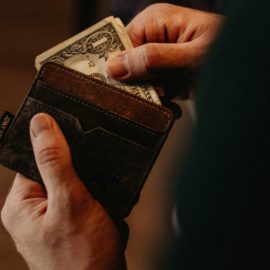
This is a free excerpt from one of Shortform’s Articles. We give you all the important information you need to know about current events and more.
Don't miss out on the whole story. Sign up for a free trial here .
Want to know how to save money during the holidays? How can you stop overspending on gifts?
With inflation cutting into Christmas budgets and a recession possible next year, shoppers in many countries are checking their Christmas lists twice—and crossing off a few things. But rather than ruining the holiday, experts say saving money during the holidays can be good for you.
Keep reading to learn how to save money during the holidays and avoid overspending.
Saving Money During the Holidays—A Good Deed
As the holiday season approaches, inflation in the U.S. and Europe is putting a crimp in the merry-making. In surveys, 82% of people in France, Germany, Italy, Spain, the UK, and the U.S. express low confidence in spending amid inflation, leaving many shoppers wondering how to save money during the holidays with fears of a looming recession.
Consumer prices in the U.S. have risen 7.75% since this time last year, far exceeding the rise in wages. This means many plan to spend less on holiday gifts. Americans say they plan to buy an average of nine gifts this year, as compared with 16 last year. While economists worry that consumer fears will further weaken the economy, others believe a less consumerism-focused holiday season is a good thing—not only for your budget, but also for the environment and your overall well-being.
In this article, we’ll look at some reasons to avoid holiday consumerism, and give you some tips on how to save money during the holidays by focusing less on the material and more on the deeper meanings of the season.
Practical Ideas
Surveys indicate that around 42% of Americans will likely go into debt to pay for the holidays this year. Meanwhile, the average American reports that they receive at least one unwanted gift during the holidays, with $16 billion wasted annually on Christmas gifts the recipient doesn’t want.
Those gifts then become clutter in the recipient’s home. Psychological research shows that living with too much clutter has a negative impact on mental health, so your gift-giving may actually contribute negatively to someone’s life rather than positively.
Some ideas for saving money during the holidays and reducing the amount of unwanted gifts include:
- Give gift cards, so the recipient can choose something they want.
- Have your friends and family members create wishlists, so you can choose something from that list to buy them.
- Consider the kinds of items you give. Clothing, accessories, household items, and cosmetics are reportedly the most unwanted gifts, while gifts of music, literature, and technology are the most appreciated.
Cultural and Spiritual Ideas
Another reason many people are aiming to save money this holiday season is simply to put the emphasis back on the more traditional aspects of the holidays, like spending time with family and focusing on cultural and spiritual customs.
The winter holiday season harks back to ages-old celebrations of the winter solstice and midwinter—celebrations of light in the darkest days of the year. Throughout history, ancient pagan mythology and traditions were combined with the Christian story of the birth of Jesus, to arrive at the Christmas customs that are common today. Hanukkah, likewise, is Judaism’s winter “festival of lights,” which celebrates a great historical victory for the Jewish people and religion.
Here are some suggestions for putting a less-consumerist focus on your holiday season:
- Make agreements with family and friends to forgo gift-giving, and focus on simply spending quality time together. Depending on your financial situation, you could also agree to give to charitable organizations instead of buying gifts.
- Attend events, such as holiday parties, religious services, caroling, and tree-lighting ceremonies.
- Volunteer at a local homeless shelter or community kitchen, to help the less fortunate in your community have a happier holiday.
- Learn about your ancestral traditions, and incorporate some of those into your holidays. For example, the Germanic tradition of Yule includes such customs as decorating a yule log and wassailing, a door-to-door singing tradition from which the custom of Christmas caroling is derived.
- Spend time connecting to nature and celebrating the winter season, as people did at this time of year in the past. Spend time outdoors watching the sunrise or sunset, build a fire, or collect items from nature to decorate your home.
Environmental Ideas
Another issue to consider is the environmental impact of our consumerist holiday customs. Not only does buying those unwanted gifts hurt your budget, it hurts the planet. Many of the holiday gifts you buy, and the paper they’re wrapped in, will end up in the trash. It’s estimated that 2.3 million pounds of wrapping paper ends up in landfills annually in the U.S. alone.
So, how can you save money during the holidays and start transitioning to more environmentally friendly gift-giving? Here are a few bits of advice:
- Shop for pre-owned items. Used bookstores and record stores are great sources for gifts for book and music lovers. Also, try local vintage and thrift stores for gently used household items.
- Make hand-made gifts, like art or baked goods.
- Give experiences instead of things. Consider tickets to music or theater events, or a gift card to a restaurant, museum, or spa.
- Give the gift of your time by offering your babysitting, household chores, or cooking services.

Want to fast-track your learning? With Shortform, you’ll gain insights you won't find anywhere else .
Here's what you’ll get when you sign up for Shortform :
- Complicated ideas explained in simple and concise ways
- Smart analysis that connects what you’re reading to other key concepts
- Writing with zero fluff because we know how important your time is






